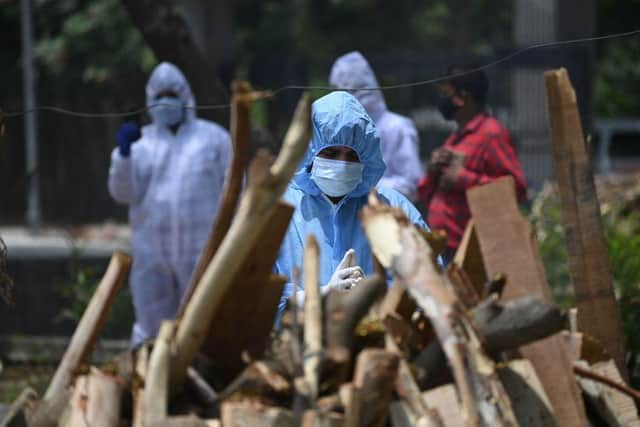Covid in Scotland: What is the Indian variant and why should we be worried about it?
So what is the Indian variant and why should we be worried about it?
There are actually three versions of the Covid-19 variant first identified in India, two which have been labelled variants “under investigation”, and one which has been upgraded to “variant of concern” both in the UK and by the World Health Organisation.
Advertisement
Hide AdAdvertisement
Hide AdVariants are given this level when they meet at least one of several markers, including being highly transmissible, causing more severe illness or being more resistant to treatment or vaccination. The Kent variant, now responsible for the majority of the cases in Scotland, is also a variant of concern.


The Indian variant is thought to be very transmissible, but there is not yet evidence that it is more dangerous than others. The most worrying thing about it is the situation in India, where the health service is completely overwhelmed and people are dying in their thousands.
Officials are not concerned about this level of crisis in the UK, but cases are nonetheless rising, and health secretary Matt Hancock labelled it the “biggest threat” to England’s easing of restrictions.
There are 18 cases in Scotland, with ten more under investigation. Chief medical officer Gregor Smith said he expects more in coming days.
England has over 500 cases, with the true number likely to have increased since that was reported. The rapid rate of growth is a real concern – cases more than doubled in a week to reach 500.
With no limitations on travel between England and Scotland, and restrictions on travel between the UK and other countries set to be eased, Scotland is likely to end up facing the same challenges with this variant as England.
The concern around it is reminiscent of that around the Kent variant in December, when it was discovered in the south of England, but quickly spread to Scotland and resulted in months of lockdown.
England’s chief medical officer alluded to this in a press conference on Monday.
Advertisement
Hide AdAdvertisement
Hide Ad“What we know with all the variants is that things can come out of a blue sky – you’re not expecting it and then something happens – that happened with the B.1.1.7 (the variant first identified in Kent), that has happened to India with this variant as well,” he said.
Dr Smith said on Tuesday that more cases of this variant are “inevitable” in Scotland, but there is currently no evidence of community transmission, as all cases have been linked to travel abroad.
There’s no reason to panic, as virus mutations are completely normal, and there is already work being done to adapt vaccines to cope with variants. It is also worth noting this isn’t the only variant of concern, with cases in the UK – there are more cases of the South Africa variant and also some of the Brazil variant.
However, neither of those have increased in case numbers quite so quickly.
National clinical director Jason Leitch said the Scottish Government was keeping “a close eye” on the India variant, with more research needed.
But he warned the rising cases were “a little picture of what the dangers are that could lie ahead”.
A message from the Editor:
Thank you for reading this article. We're more reliant on your support than ever as the shift in consumer habits brought about by coronavirus impacts our advertisers.
If you haven't already, please consider supporting our trusted, fact-checked journalism by taking out a digital subscription.
Comments
Want to join the conversation? Please or to comment on this article.
